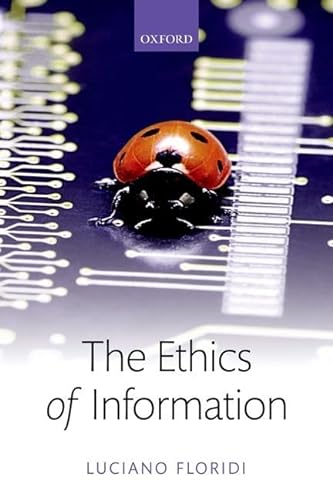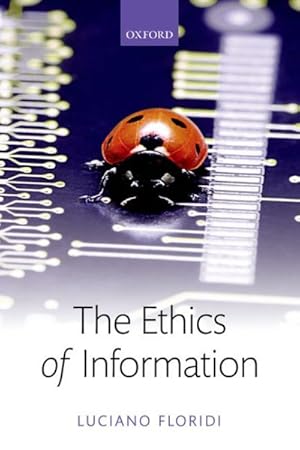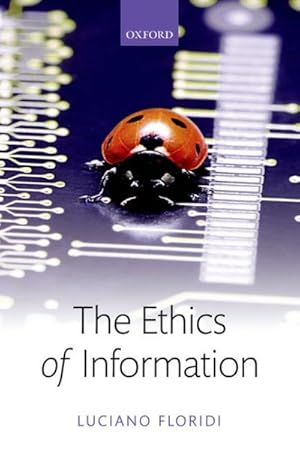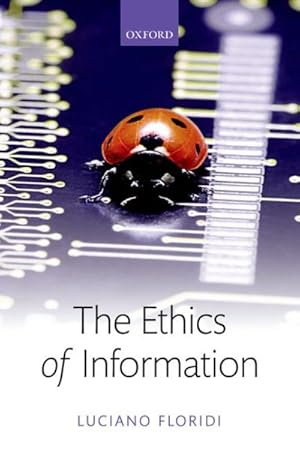9780198748052 - The Ethics of Information von Floridi, Luciano (27 Ergebnisse)
Suchfilter
Produktart
- Alle Product Types
- Bücher (27)
- Magazine & Zeitschriften (Keine weiteren Ergebnisse entsprechen dieser Verfeinerung)
- Comics (Keine weiteren Ergebnisse entsprechen dieser Verfeinerung)
- Noten (Keine weiteren Ergebnisse entsprechen dieser Verfeinerung)
- Kunst, Grafik & Poster (Keine weiteren Ergebnisse entsprechen dieser Verfeinerung)
- Fotografien (Keine weiteren Ergebnisse entsprechen dieser Verfeinerung)
- Karten (Keine weiteren Ergebnisse entsprechen dieser Verfeinerung)
- Manuskripte & Papierantiquitäten (Keine weiteren Ergebnisse entsprechen dieser Verfeinerung)
Zustand Mehr dazu
- Neu (19)
- Wie Neu, Sehr Gut oder Gut Bis Sehr Gut (4)
- Gut oder Befriedigend (4)
- Ausreichend oder Schlecht (Keine weiteren Ergebnisse entsprechen dieser Verfeinerung)
- Wie beschrieben (Keine weiteren Ergebnisse entsprechen dieser Verfeinerung)
Einband
- alle Einbände
- Hardcover (Keine weiteren Ergebnisse entsprechen dieser Verfeinerung)
- Softcover (27)
Weitere Eigenschaften
- Erstausgabe (Keine weiteren Ergebnisse entsprechen dieser Verfeinerung)
- Signiert (Keine weiteren Ergebnisse entsprechen dieser Verfeinerung)
- Schutzumschlag (Keine weiteren Ergebnisse entsprechen dieser Verfeinerung)
- Angebotsfoto (12)
- Keine Print-on-Demand Angebote (26)
Sprache (1)
Gratisversand
Land des Verkäufers
Verkäuferbewertung
-
paperback. Zustand: Good. Reprint. Ships in a BOX from Central Missouri! May not include working access code. Will not include dust jacket. Has used sticker(s) and some writing or highlighting. UPS shipping for most packages, (Priority Mail for AK/HI/APO/PO Boxes).
-
Paperback. Zustand: Very Good. First Paperback Edition. 8vo - over 7¾" - 9¾".
-
Zustand: good. May show signs of wear, highlighting, writing, and previous use. This item may be a former library book with typical markings. No guarantee on products that contain supplements Your satisfaction is 100% guaranteed. Twenty-five year bookseller with shipments to over fifty million happy customers.
-
EUR 28,52
EUR 6,35 für den Versand von Vereinigtes Königreich nach USAAnzahl: 1 verfügbar
In den WarenkorbPaperback. Zustand: Fine.
-
EUR 37,61
EUR 2,28 für den Versand innerhalb von/der USAAnzahl: Mehr als 20 verfügbar
In den WarenkorbZustand: New.
-
EUR 36,42
EUR 3,44 für den Versand innerhalb von/der USAAnzahl: Mehr als 20 verfügbar
In den Warenkorbpaperback. Zustand: New. Reprint. Ships in a BOX from Central Missouri! Ships same or next business day. UPS shipping for most packages, (Priority Mail for AK/HI/APO/PO Boxes).
-
EUR 44,84
EUR 2,28 für den Versand innerhalb von/der USAAnzahl: Mehr als 20 verfügbar
In den WarenkorbZustand: As New. Unread book in perfect condition.
-
Paperback. Zustand: new. Excellent Condition.Excels in customer satisfaction, prompt replies, and quality checks.
-
EUR 40,88
EUR 7,37 für den Versand von Vereinigtes Königreich nach USAAnzahl: 1 verfügbar
In den WarenkorbZustand: New. pp. 384.
-
The Ethics of Information (Paperback)
Verlag: Oxford University Press, Oxford, 2015
ISBN 10: 0198748051 ISBN 13: 9780198748052
Sprache: Englisch
Anbieter: Grand Eagle Retail, Bensenville, IL, USA
Paperback. Zustand: new. Paperback. Luciano Floridi develops an original ethical framework for dealing with the new challenges posed by Information and Communication Technologies (ICTs). ICTs have profoundly changed many aspects of life, including the nature of entertainment, work, communication, education, health care, industrial production and business, social relations, and conflicts. They have had a radical and widespread impact on our moral lives and on contemporary ethical debates. Privacy,ownership, freedom of speech, responsibility, technological determinism, the digital divide, and pornography online are only some of the pressing issues that characterise the ethical discourse in theinformation society. They are the subject of Information Ethics (IE), the new philosophical area of research that investigates the ethical impact of ICTs on human life and society. Since the seventies, IE has been a standard topic in many curricula. In recent years, there has been a flourishing of new university courses, international conferences, workshops, professional organizations, specialized periodicals and research centres. However, investigations have so far beenlargely influenced by professional and technical approaches, addressing mainly legal, social, cultural and technological problems. This book is the first philosophical monograph entirely and exclusivelydedicated to it. Floridi lays down, for the first time, the conceptual foundations for IE. He does so systematically, by pursuing three goals: a) a metatheoretical goal: it describes what IE is, its problems, approaches and methods;b) an introductory goal: it helps the reader to gain a better grasp of the complex and multifarious nature of the various concepts and phenomena related to computer ethics;c) an analytic goal: itanswers several key theoretical questions of great philosophical interest, arising from the investigation of the ethical implications of ICTs. Although entirely independent of ThePhilosophy of Information (OUP, 2011), Floridi's previous book, The Ethics of Information complements it as new work on the foundations of the philosophy of information. Luciano Floridi develops the first ethical framework for dealing with the new challenges posed by Information and Communication Technologies (ICTs). He establishes the conceptual foundations of Information Ethics by exploring important metatheoretical and introductory issues, and answering theoretical questions of great philosophical interest. Shipping may be from multiple locations in the US or from the UK, depending on stock availability.
-
Softcover. Zustand: Fine. Leichte Risse. Luciano Floridi develops an original ethical framework for dealing with the new challenges posed by Information and Communication Technologies (ICTs). ICTs have profoundly changed many aspects of life, including the nature of entertainment, work, communication, education, health care, industrial production and business, social relations, and conflicts. They have had a radical and widespread impact on our moral lives and on contemporary ethical debates. Privacy, ownership, freedom of speech, responsibility, technological determinism, the digital divide, and pornography online are only some of the pressing issues that characterise the ethical discourse in the information society. They are the subject of Information Ethics (IE), the new philosophical area of research that investigates the ethical impact of ICTs on human life and society. Since the seventies, IE has been a standard topic in many curricula. In recent years, there has been a flourishing of new university courses, international conferences, workshops, professional organizations, specialized periodicals and research centres. However, investigations have so far been largely influenced by professional and technical approaches, addressing mainly legal, social, cultural and technological problems. This book is the first philosophical monograph entirely and exclusively dedicated to it. Floridi lays down, for the first time, the conceptual foundations for IE. He does so systematically, by pursuing three goals: a) a metatheoretical goal: it describes what IE is, its problems, approaches and methods; b) an introductory goal: it helps the reader to gain a better grasp of the complex and multifarious nature of the various concepts and phenomena related to computer ethics; c) an analytic goal: it answers several key theoretical questions of great philosophical interest, arising from the investigation of the ethical implications of ICTs. Although entirely independent of The Philosophy of Information (OUP, 2011), Floridi's previous book, The Ethics of Information complements it as new work on the foundations of the philosophy of information.
-
EUR 38,39
EUR 17,01 für den Versand von Vereinigtes Königreich nach USAAnzahl: 5 verfügbar
In den WarenkorbZustand: good. May show signs of wear, highlighting, writing, and previous use. This item may be a former library book with typical markings. No guarantee on products that contain supplements Your satisfaction is 100% guaranteed. Twenty-five year bookseller with shipments to over fifty million happy customers.
-
EUR 46,00
EUR 17,01 für den Versand von Vereinigtes Königreich nach USAAnzahl: Mehr als 20 verfügbar
In den WarenkorbZustand: New.
-
EUR 51,29
EUR 13,59 für den Versand von Vereinigtes Königreich nach USAAnzahl: 2 verfügbar
In den WarenkorbZustand: New. In.
-
The Ethics of Information
Verlag: Oxford University Press 2015-10-08, 2015
ISBN 10: 0198748051 ISBN 13: 9780198748052
Sprache: Englisch
Anbieter: Chiron Media, Wallingford, Vereinigtes Königreich
EUR 50,45
EUR 17,57 für den Versand von Vereinigtes Königreich nach USAAnzahl: 2 verfügbar
In den WarenkorbPaperback. Zustand: New.
-
EUR 51,56
EUR 17,01 für den Versand von Vereinigtes Königreich nach USAAnzahl: Mehr als 20 verfügbar
In den WarenkorbZustand: As New. Unread book in perfect condition.
-
Zustand: New. . 2015. Reprint. Paperback. . . . .
-
EUR 58,87
EUR 11,34 für den Versand von Vereinigtes Königreich nach USAAnzahl: 2 verfügbar
In den WarenkorbPaperback. Zustand: Brand New. reprint edition. 357 pages. 9.00x6.00x1.00 inches. In Stock.
-
EUR 54,26
EUR 19,12 für den Versand von Vereinigtes Königreich nach USAAnzahl: 15 verfügbar
In den WarenkorbPaperback / softback. Zustand: New. New copy - Usually dispatched within 4 working days. 611.
-
EUR 67,36
EUR 11,34 für den Versand von Vereinigtes Königreich nach USAAnzahl: 1 verfügbar
In den WarenkorbPaperback. Zustand: Brand New. reprint edition. 357 pages. 9.00x6.00x1.00 inches. In Stock.
-
Zustand: New. . 2015. Reprint. Paperback. . . . . Books ship from the US and Ireland.
-
EUR 46,90
EUR 46,50 für den Versand von Vereinigtes Königreich nach USAAnzahl: 2 verfügbar
In den WarenkorbZustand: NEW.
-
The Ethics of Information (Paperback)
Verlag: Oxford University Press, Oxford, 2015
ISBN 10: 0198748051 ISBN 13: 9780198748052
Sprache: Englisch
Anbieter: CitiRetail, Stevenage, Vereinigtes Königreich
EUR 54,89
EUR 41,96 für den Versand von Vereinigtes Königreich nach USAAnzahl: 1 verfügbar
In den WarenkorbPaperback. Zustand: new. Paperback. Luciano Floridi develops an original ethical framework for dealing with the new challenges posed by Information and Communication Technologies (ICTs). ICTs have profoundly changed many aspects of life, including the nature of entertainment, work, communication, education, health care, industrial production and business, social relations, and conflicts. They have had a radical and widespread impact on our moral lives and on contemporary ethical debates. Privacy,ownership, freedom of speech, responsibility, technological determinism, the digital divide, and pornography online are only some of the pressing issues that characterise the ethical discourse in theinformation society. They are the subject of Information Ethics (IE), the new philosophical area of research that investigates the ethical impact of ICTs on human life and society. Since the seventies, IE has been a standard topic in many curricula. In recent years, there has been a flourishing of new university courses, international conferences, workshops, professional organizations, specialized periodicals and research centres. However, investigations have so far beenlargely influenced by professional and technical approaches, addressing mainly legal, social, cultural and technological problems. This book is the first philosophical monograph entirely and exclusivelydedicated to it. Floridi lays down, for the first time, the conceptual foundations for IE. He does so systematically, by pursuing three goals: a) a metatheoretical goal: it describes what IE is, its problems, approaches and methods;b) an introductory goal: it helps the reader to gain a better grasp of the complex and multifarious nature of the various concepts and phenomena related to computer ethics;c) an analytic goal: itanswers several key theoretical questions of great philosophical interest, arising from the investigation of the ethical implications of ICTs. Although entirely independent of ThePhilosophy of Information (OUP, 2011), Floridi's previous book, The Ethics of Information complements it as new work on the foundations of the philosophy of information. Luciano Floridi develops the first ethical framework for dealing with the new challenges posed by Information and Communication Technologies (ICTs). He establishes the conceptual foundations of Information Ethics by exploring important metatheoretical and introductory issues, and answering theoretical questions of great philosophical interest. Shipping may be from our UK warehouse or from our Australian or US warehouses, depending on stock availability.
-
Zustand: New. Luciano Floridi develops the first ethical framework for dealing with the new challenges posed by Information and Communication Technologies (ICTs). He establishes the conceptual foundations of Information Ethics by exploring important metatheoretical and i.
-
The Ethics of Information
Verlag: Oxford University Press Dez 2015, 2015
ISBN 10: 0198748051 ISBN 13: 9780198748052
Sprache: Englisch
Anbieter: AHA-BUCH GmbH, Einbeck, Deutschland
Taschenbuch. Zustand: Neu. Neuware - Luciano Floridi develops an original ethical framework for dealing with the new challenges posed by Information and Communication Technologies (ICTs). ICTs have profoundly changed many aspects of life, including the nature of entertainment, work, communication, education, health care, industrial production and business, social relations, and conflicts. They have had a radical and widespread impact on our moral lives and on contemporary ethical debates. Privacyownership, freedom of speech, responsibility, technological determinism, the digital divide, and pornography online are only some of the pressing issues that characterise the ethical discourse in the information society. They are the subject of Information Ethics (IE), the new philosophical area ofresearch that investigates the ethical impact of ICTs on human life and society.Since the seventies, IE has been a standard topic in many curricula. In recent years, there has been a flourishing of new university courses, international conferences, workshops, professional organizations, specialized periodicals and research centres. However, investigations have so far been largely influenced by professional and technical approaches, addressing mainly legal, social, cultural and technological problems. This book is the first philosophical monograph entirely and exclusivelydedicated to it.Floridi lays down, for the first time, the conceptual foundations for IE. He does so systematically, by pursuing three goals:a) a metatheoretical goal: it describes what IE is, its problems, approaches and methods;b) an introductory goal: it helps the reader to gain a better grasp of the complex and multifarious nature of the various concepts and phenomena related to computer ethics;c) an analytic goal: it answers several key theoretical questions of great philosophical interest, arising from the investigation of the ethical implications of ICTs.Although entirely independent of The Philosophy of Information (OUP, 2011), Floridi's previous book, The Ethics of Information complements it as new work on the foundations of the philosophy of information.
-
The Ethics of Information (Paperback)
Verlag: Oxford University Press, Oxford, 2015
ISBN 10: 0198748051 ISBN 13: 9780198748052
Sprache: Englisch
Anbieter: AussieBookSeller, Truganina, VIC, Australien
Paperback. Zustand: new. Paperback. Luciano Floridi develops an original ethical framework for dealing with the new challenges posed by Information and Communication Technologies (ICTs). ICTs have profoundly changed many aspects of life, including the nature of entertainment, work, communication, education, health care, industrial production and business, social relations, and conflicts. They have had a radical and widespread impact on our moral lives and on contemporary ethical debates. Privacy,ownership, freedom of speech, responsibility, technological determinism, the digital divide, and pornography online are only some of the pressing issues that characterise the ethical discourse in theinformation society. They are the subject of Information Ethics (IE), the new philosophical area of research that investigates the ethical impact of ICTs on human life and society. Since the seventies, IE has been a standard topic in many curricula. In recent years, there has been a flourishing of new university courses, international conferences, workshops, professional organizations, specialized periodicals and research centres. However, investigations have so far beenlargely influenced by professional and technical approaches, addressing mainly legal, social, cultural and technological problems. This book is the first philosophical monograph entirely and exclusivelydedicated to it. Floridi lays down, for the first time, the conceptual foundations for IE. He does so systematically, by pursuing three goals: a) a metatheoretical goal: it describes what IE is, its problems, approaches and methods;b) an introductory goal: it helps the reader to gain a better grasp of the complex and multifarious nature of the various concepts and phenomena related to computer ethics;c) an analytic goal: itanswers several key theoretical questions of great philosophical interest, arising from the investigation of the ethical implications of ICTs. Although entirely independent of ThePhilosophy of Information (OUP, 2011), Floridi's previous book, The Ethics of Information complements it as new work on the foundations of the philosophy of information. Luciano Floridi develops the first ethical framework for dealing with the new challenges posed by Information and Communication Technologies (ICTs). He establishes the conceptual foundations of Information Ethics by exploring important metatheoretical and introductory issues, and answering theoretical questions of great philosophical interest. Shipping may be from our Sydney, NSW warehouse or from our UK or US warehouse, depending on stock availability.
-
The Ethics of Information (eng)
Anbieter: Brook Bookstore On Demand, Napoli, NA, Italien
EUR 45,39
EUR 6,80 für den Versand von Italien nach USAAnzahl: Mehr als 20 verfügbar
In den WarenkorbZustand: new. Questo è un articolo print on demand.














